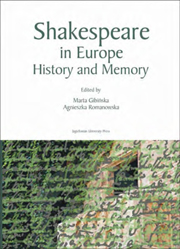Book contents
- Frontmatter
- Contents
- Preface
- Towards a European History of Henry V
- History and Histories
- The Bad Quarto Hamlet and the Polish Connection
- Cross-Histories, Straying Narratives: Anglo-Portuguese Imbrications and Shakespeare's History Plays
- The Art of War in Shakespeare and in European Renaissance Treatises
- The “Histories” of Henry VI
- Shakespeare's Imperfect Memory of History
- “Retail'd to All Posterity:” The Case of Richard III
- Halting Modernity: Richard III's Preposterous Body and History
- History and Memory: Criticism and Reception
- History, Memory, and Ideological Appropriation
- Theatre: The Act of Memory and History in the Making
- Index of Authors
Shakespeare's Imperfect Memory of History
from History and Histories
Published online by Cambridge University Press: 05 September 2014
- Frontmatter
- Contents
- Preface
- Towards a European History of Henry V
- History and Histories
- The Bad Quarto Hamlet and the Polish Connection
- Cross-Histories, Straying Narratives: Anglo-Portuguese Imbrications and Shakespeare's History Plays
- The Art of War in Shakespeare and in European Renaissance Treatises
- The “Histories” of Henry VI
- Shakespeare's Imperfect Memory of History
- “Retail'd to All Posterity:” The Case of Richard III
- Halting Modernity: Richard III's Preposterous Body and History
- History and Memory: Criticism and Reception
- History, Memory, and Ideological Appropriation
- Theatre: The Act of Memory and History in the Making
- Index of Authors
Summary
Shakespeare's history plays used to be and still are regarded as a reliable source of information on English (medieval) history. According to Coleridge, John Churchill, the first Duke of Marlborough, was “not ashamed to confess that his principal acquaintance with English history was derived from Shakespeare's plays.” And David Scott Kastan, referring to this fact, continues: “No doubt he speaks for many more now […] whose acquaintance with England's medieval past comes via Shakespeare.” Furthermore, over the years Shakespeare's histories appear to have taken on a kind of popular mythical status and so themselves have shaped historical consciousness. Yet Shakespeare was a poet or dramatist rather than a historian, a distinction already established in the sixteenth century and defined by Sir Philip Sidney:
[…] the Historian […] is so tied […] to what is, to the particular truth of things, and not to the general reason of things, that his example draweth no necessarie consequence, and therefore a lesse fruitfull doctrine. [Poets, by contrast,] borrow nothing of what is, hath bin, or shall be … he citeth no authorities of other histories … the Poets persons and dooings, are but pictures, what should be, and not stories what have bin.
Shakespeare definitely does not turn history upside down, he always retains the basic outlines of what his audiences expected, yet at the same time does not feel “tied down” to the details of historical events and figures.
- Type
- Chapter
- Information
- Shakespeare in EuropeHistory and Memory, pp. 89 - 98Publisher: Jagiellonian University PressPrint publication year: 2008

